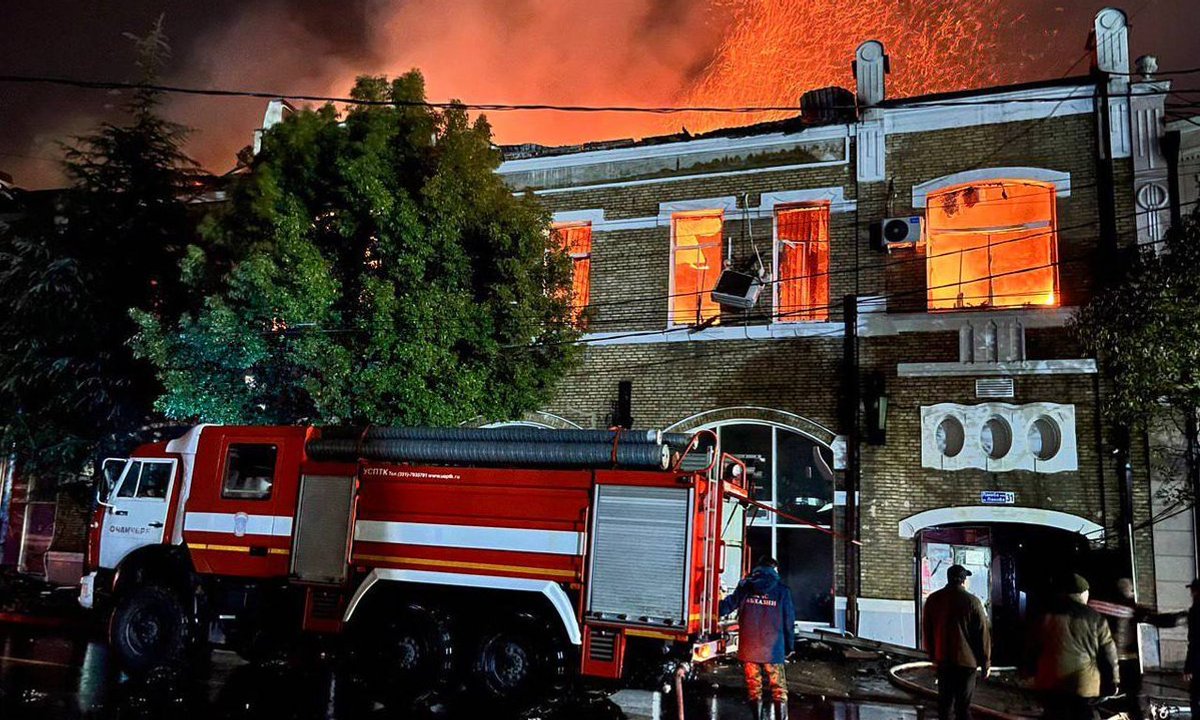A massive fire has destroyed more than 4,000 paintings from the collection of the National Picture Gallery of Abkhazia, a staggering loss of cultural patrimony for the Black Sea Caucasus region that was riven by war after it broke away from Georgia in the 1990s and is now under Russian sway.
The fire took place early on 21 January in the capital Sukhumi. It started in a bank before spreading next door to the art gallery of the Union of Artists of Abkhazia, where the paintings were stored, according to Ekho Kavkaza, a platform covering the region for the US-government funded media organisation Radio Free Europe/Radio Liberty. The National Picture Gallery building where they are supposed to be kept has been in disrepair for years, “without a roof or doors”, according to the site.
As the fire burned, Abkhazia’s acting culture minister, Dinara Smyr, referenced the extent of the loss it represented to Abkhazia’s cultural heritage, reportedly saying that “the entire golden fund of Abkhazian artists is under threat.” Abkhazia’s prosecutor general’s office reported that it has launched criminal proceedings to determine the cause of the fire.
Suram Sakaniya, director of the National Gallery, told Ekho Kavkaza that the government had not reacted to previous pleas to improve conditions. He said that “approximately 100 to 200” paintings—primarily from the Soviet era—had survived, some half burned or torn by fallen beams. “Ceramics broke from the heat” of the fire and “bronze statuettes and sculptures that were there melted,” he added.
Among the biggest losses were works by Varvara Bubnova and Aleksandr Shervashidze-Chachba. Bubnova was a Russian avant-garde artist who lived for years in Japan—joining her sister, the violinist Anna Bubnova-Ono, who had married to Yoko Ono’s uncle. Bubnova returned to the Soviet Union after Stalin’s death to live and work in Sukhumi, where she is buried.
Shervashidze-Chachba, regarded as Abkhazia’s first professional artist, was from a noble family. He died in exile in Monaco in 1968 before being reburied in Sukhumi in 1985. As a scenographer he worked with other artists including Alexandre Benois and Pablo Picasso. About 300 of his works perished in the fire, former Abkhazian foreign minister Vyacheslav Chirikba, who has been collecting archival materials for a permanent exhibition about Shervashidze-Chachba, told JAMnews, a Caucasus media platform.
Following the disaster, the family of Dmitry Gulia, who is seen as a founder of Abkhaz literature, called for upcoming festivities marking the 150th anniversary of his birth to be called off, warning about faulty wiring in his house-museum.
KharakhPitsunda, an activist youth organisation, was quoted as saying that the government “has the blood of our culture on its hands,” but also held the wider community in Abkhazian to blame for the tragedy due to its inaction. “We had to demand, we had to pay more attention, we had to achieve,” the group said.
Olga Lyubimova, Russia’s culture minister, said on Monday that specialists from the State Russian Museum, the State Tretyakov Gallery and the Grabar Art Conservation Centre are being sent to Sukhumi.
Abkhazia broke away from Georgia following a war in 1992-3. Abkhazian forces fought with Russia in another conflict with Georgia in 2008, after which Russia recognised Abkhazia as independent. Georgia regards it today as occupied by Russia.
